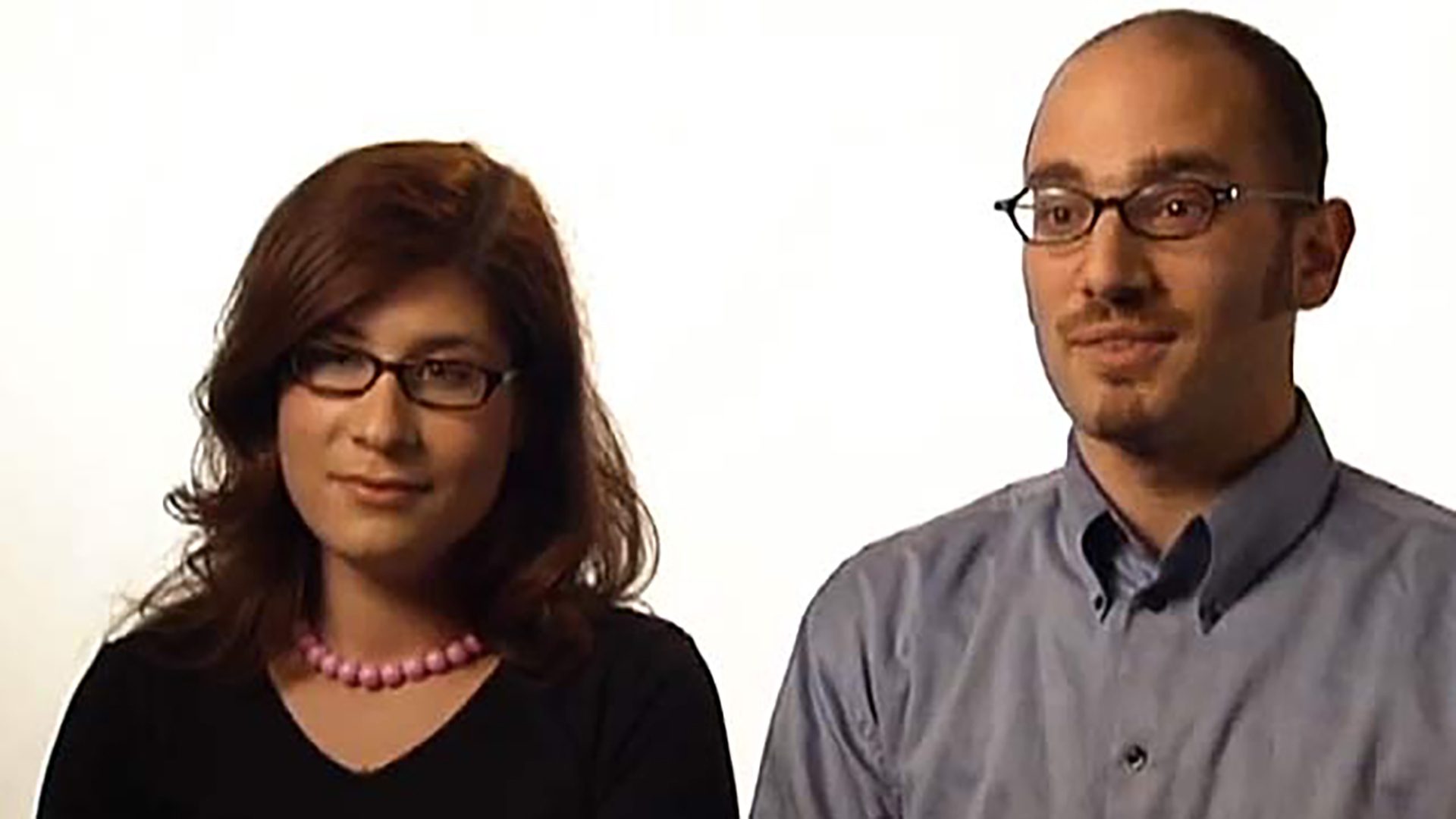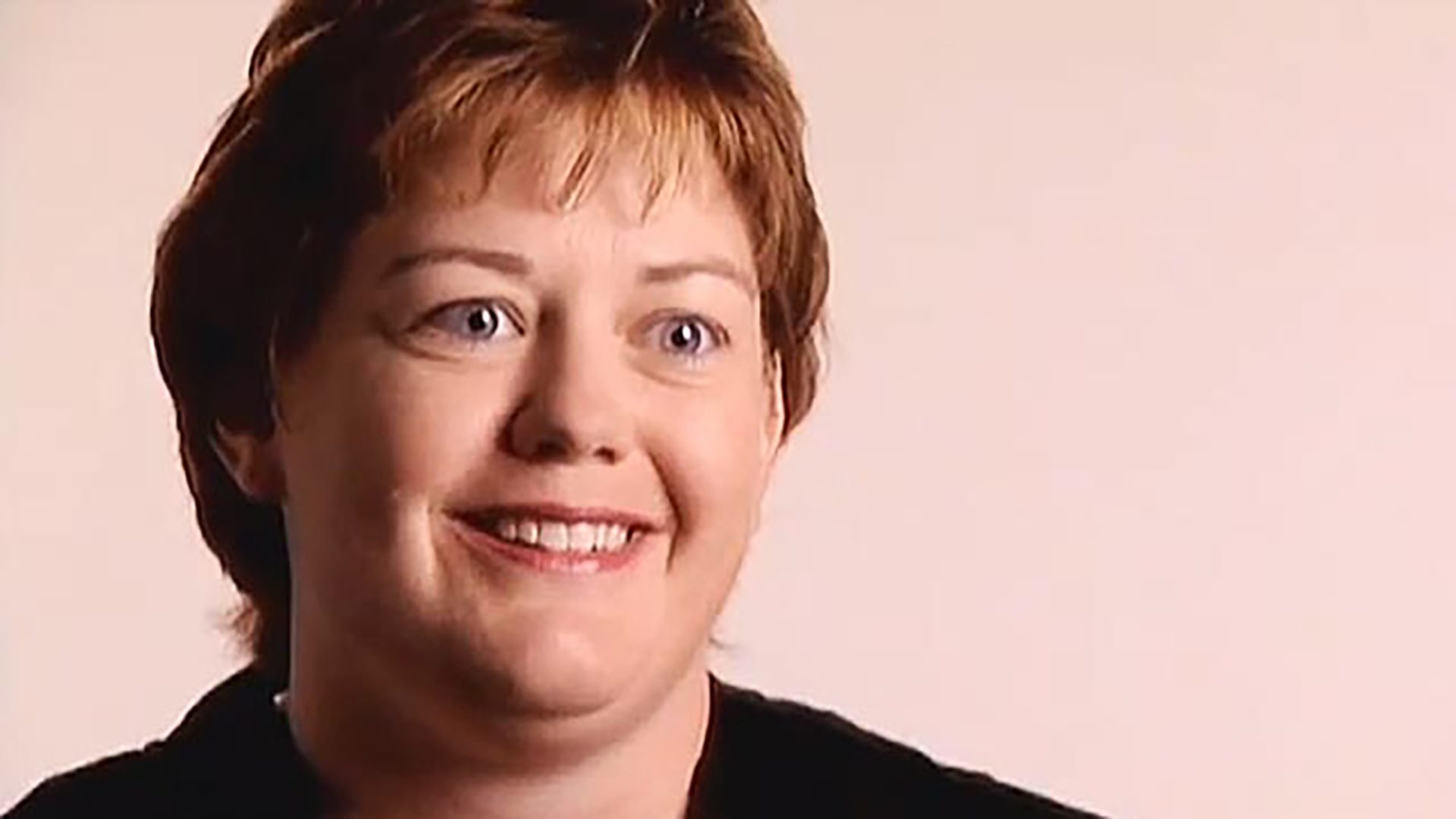Survivor Interview – Elizabeth & Danny N.
Danny is a Hodgkin’s lymphoma survivor. He and his wife Elizabeth talk about grief and loss, infertility, and finding meaning in their cancer experience.

Danny: I became a survivor in February of 1998 when I was diagnosed with Hodgkin’s disease. I found a lump in my neck. We had to do a biopsy, and it was Hodgkin’s disease. I had six months of chemotherapy, ABBD, which is a typical chemotherapy for Hodgkin’s disease. I didn’t have radiation because I had cancer both in my neck and upper chest area. Because we did extra chemotherapy, we didn’t need to do radiation. When I was re-diagnosed three years later, I actually had some cancer cells in my abdomen. Because of that, it’s likely that the radiation wouldn’t have stopped a recurrence anyway, because there had already been some cells in my abdomen.
In November and December of 2000, we started noticing something on my neck again. The doctor wasn’t sure. It was pretty small in my neck in comparison to the first time. We kept track of it for a few weeks, and eventually the surgeon said the only way to know is for us to do a biopsy. I had preliminary chemotherapy for three months, and then a bone marrow transplant in May of 2001. I was the fastest person ever to get out of my kind of stem cell transplant at this particular hospital.
Elizabeth: I knew him the first time he was sick, but just as acquaintances through a mutual friend. I knew all along. When we decided to start dating, I knew that he was a cancer survivor. I definitely thought about it as something that might be an issue. It was a strange thing because it was such a big part of his life that I wasn’t really involved in. But I knew what I was getting into. I knew that there was a possibility that it could recur.
Danny: Every time anything happens at all, if I cut myself, if I have a funny cholesterol level, if I feel like I have the flu, the first thing that we think about is cancer, even if we know that this probably doesn’t have anything to do with that. When we hear about other people who have medical issues, our first thing to think is, “Has anyone checked to see whether it has to do with cancer?” It is an overarching thing for us. For me, it’s just because we’re so cautious about it. We want to be sure that we know everything. For other people, it’s probably a little overbearing that our first thought is that someone may have cancer.
Elizabeth: There is definitely anxiety around it. I don’t think there’s a day that goes by when I don’t think about the fact that he had cancer and worry about him getting cancer again. It’s definitely something I can live with, and it definitely makes me see life in a different way. I guess I appreciate things in a different way.
I started working at the American Cancer Society after Danny had gone through his whole transplant. It seems like one of those things that just fell into my lap. Working there has definitely helped me work through a lot of different things, and it’s been very cathartic in a lot of ways. It makes me feel like I’m doing something. I think one of the main things that I would say, as the spouse of somebody who had cancer, is there’s a lot of helplessness. I felt very helpless a lot of the time. I think working at ACS and doing something has made me feel like I’m contributing, and I’m helping to manage a situation that in all ways is really unmanageable. We’ve no control over whether he’ll get sick again.
Danny: In terms of her caregiving, I think that we both feel like we went through it together and my family as well. And her family. I don’t think it was confined to the two of us. Part of what I think I learned in the process was that I wasn’t the only one going through it. I knew how I felt physically and emotionally, but it was hard to understand how somebody else would feel, particularly a spouse. Elizabeth, in particular, knowing that the whole experience affected her in equally as intense of a way as it did for me. It was not necessarily the same experience, but we both experienced it at the same time. Learning that was a pretty important lesson for me.
Elizabeth: The most important thing that I would want to stress about the whole experience is when Danny was having treatment; I don’t think that was the difficult time. We were still focused on what he was doing. It was like tunnel vision. Life was about what’s happening when he has his chemo next week, and what foods is he gonna be able to eat and not eat, and the transplant’s in May. I don’t think we even thought about after. We just thought about after as when everything is done, that’ll be great. In reality, when everything was done, that was the hardest time, because I suddenly realized, “We don’t have doctors here all the time that we’re talking to that we can ask about every little thing.” Obviously, we could call them, but they weren’t there like they were before. We have no idea what’s gonna happen. Suddenly, it hit me, “Oh, my God. This is what we just went through.”
Danny: We had a little bit of separation anxiety from the little nest that we were living in when I was being treated. Somehow, because you’ve already taken it as a given that you’re sick or that your spouse is sick, you expect that there are all of these people who are going to be taking care of you all the time, either as a person or as a family unit. All the people who had been around me all the time, besides my family, were no longer there. That was an odd experience. I dealt with it slowly. Once you realize that you’re gonna be okay, and you realize you don’t need any of that stuff anymore, it starts to get better.
Elizabeth: It’s very frightening. I had more fear, because I was afraid of him getting sick again. It never occurred to me during the whole time that he was being treated that he could get sick again. I didn’t realize that until afterwards. It really hit me. Particularly because we had just gotten engaged right before Danny went into the hospital for his transplant, we were planning our wedding and thinking about spending the rest of our lives together. Every so often, I would suddenly realize, “What if? What if we’re not going to? What if he dies?” It was much scarier than during treatment, and it lasted a while.
Danny: When I was finishing my treatment the first time in ’98, I got hepatitis B. We’re not really sure how I got it. There’s no question that I had a compromised immune system. Somehow, I became exposed to it, either through my treatment process or through something else. I noticed it because I was jaundiced. My skin was yellow, the whites of my eyeballs were yellow, and my urine was a brownish Coke color. That was a little freaky. When we went to the doctor, everything turned out to be fine. My symptoms were already disappearing, and I didn’t require any treatment for it. It’s strange to think that I had this other thing probably because of the cancer. It reinforced to me that there are other things I could get because of cancer. The hepatitis is all done.
I went to the sperm bank. It’s an awkward thing to do in general. You’re faced with this treatment schedule that has to start, and you’re bound at some level, in terms of when you can actually go and do that. I seem to be all right, and it didn’t affect my ability to have children the first time. But the second time, the expectation was that I wasn’t gonna be able to have children naturally, and we would have to have some sort of in vitro fertilization. I went back to the reproductive lab, and it turns out that I’m able to still have children, although the likelihood is pretty low.
Elizabeth: We’re not banking on having children naturally. I think the expectation is that we’ll probably have to have some intervention.
Danny: It’s odd, but we feel lucky that we’re able to do it. Science has advanced in such a way that enables us to have children. The banking was something that the doctor suggested. I think the doctors brought it up, but I don’t think that they were necessarily forceful about it; because their main focus is making sure you stay alive. It’s something that’s on their mind, but not necessarily something that they really stress. That can be difficult for people who are encountering it for the first time. It’s not something you’d be thinking of. In my second treatment, I knew all about it. I knew that I had to do this, and we were very quick to make any appointments we needed to make.
Elizabeth: Survivorship. I think, for me, the most important part of this whole experience has been what I described in terms of the post-cancer feeling and realizing that survivorship is a great feeling, but it also has feelings of anxiety and guilt. There’s a whole lot that goes into it. I think that my focus since Danny got sick has been about dealing with young people in survivorship, because there are so many different issues that go along with it that are not the same for children with cancer or for older adults with cancer. We actually had a number of friends that have been our age that have had cancer. Just trying to help provide resources for people when they have questions about, if you’re in your 20’s, “How do you tell people that you had cancer? How do you deal with being unemployed for a while during your treatment, getting back into life and getting a job again when you’re just starting your career? In terms of survivorship, my goals are to help other people in that sense and to realize that survivorship has a lot of different parts to it.
Danny: I think, for me, survivorship is recognizing that this is a part of me, to such an extent that I don’t think I would do anything different. I don’t think I would ask for anything different in terms of my life. The fact that I’m here is great for me and for us. I look back on our experience fondly. It was wrapped up so much in terms of who we are today. We went through this together. We got engaged virtually moments before I went into the hospital. Our marriage ceremony included a lot of discussion about my mortality and what we went through together. I feel like survivorship is about recognizing who you are, and if you’re lucky enough to be still here, it is you. I don’t think I could be as happy as I am now without having had this experience.
Elizabeth: I’m Elizabeth Navisky.
Danny: I’m Danny Navisky, I’m 29 years old, and I’m a six-year cancer survivor.

